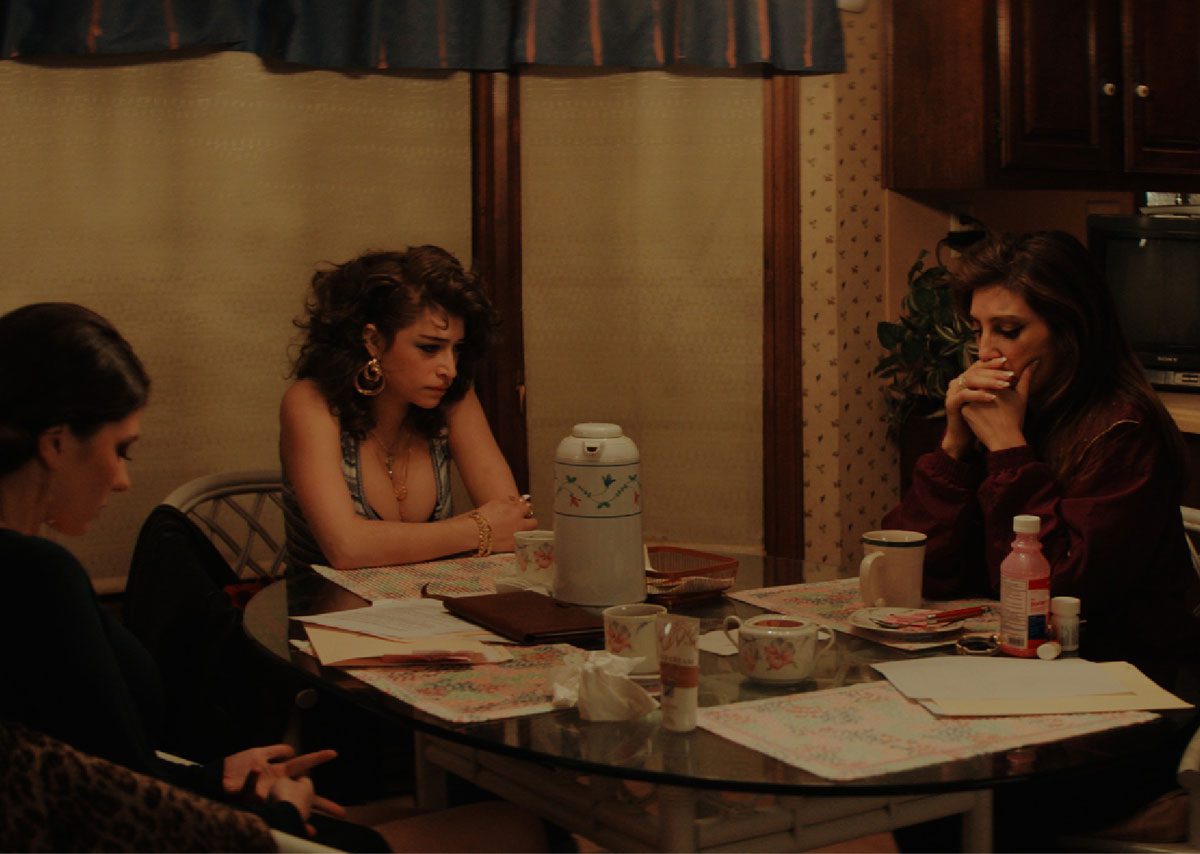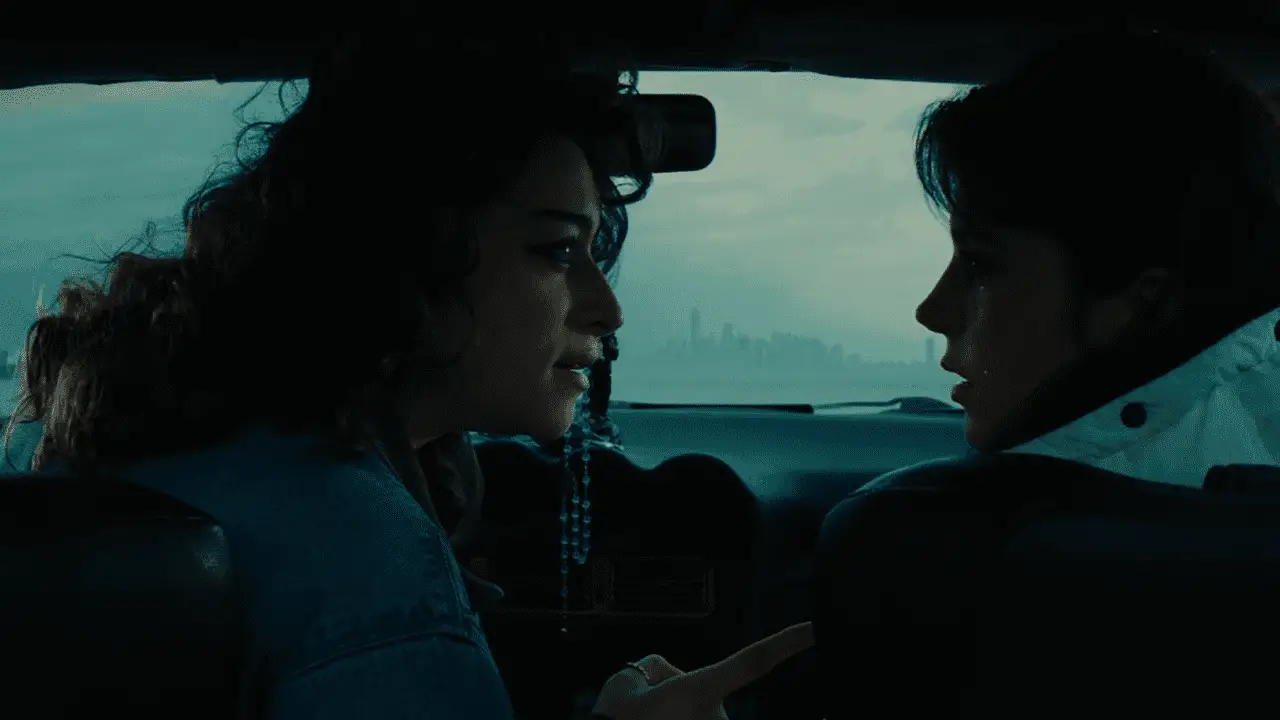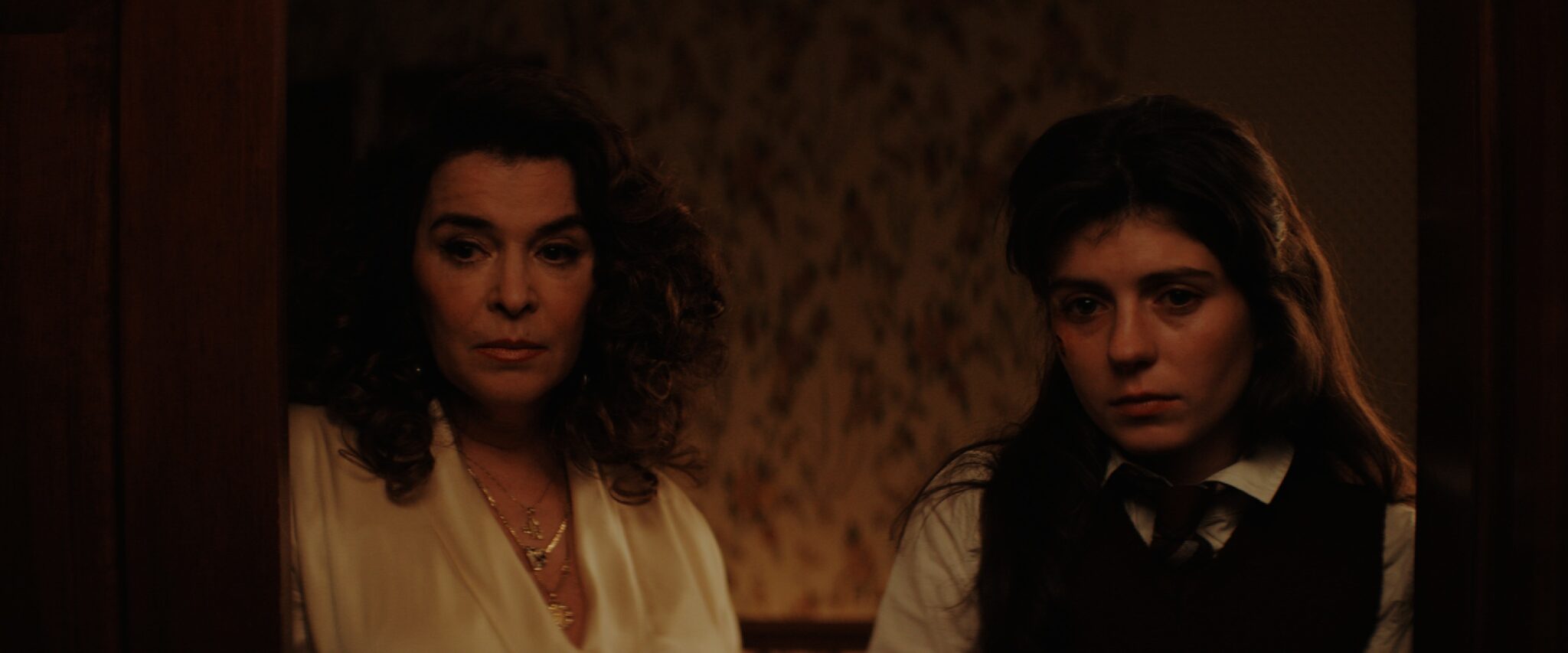The best movies about the mob are rarely merely about the mob. They use the mob to smuggle in ideas about America, toxic masculinity, and capitalism. Most of the time, not always, but a lot of the time, they center on men.
Jennifer Esposito’s writing and directorial debut Fresh Kills, is a movie that uses the mob as an excuse to look at rage embedded in womanhood. Set in the 80s and 90s in Staten Island, Esposito looks at a rage born of being trapped and pushed to the sidelines. Much like Goodfellas there is an undercurrent of boiling anger that threatens to erupt at any moment.

Esposito makes the violence in the film sudden and quick. The real feeling of danger is when Rose (Emily Bader), the youngest daughter of the Larusso family, is forced to choose between herself and her family. Rose is a quiet, observant girl unlike her older sister Connie (Odessa A’zion) who never lets a thought go unuttered or a feeling unexpressed.
Bader and A’zion are fearless in their portrayals of sisters who are loyal and yet rivals. They are rivals not merely for their parent’s affection but for the freedom they see the other having. Rose wishes she had Connie’s confidence, the self-possession that allows her to dominate every room she walks into. But Connie wishes she had Rose’s smarts and courage to stand up to what she sees. But none of this is said, it is shown in the way their eyes blaze and observe each other.
Esposito’s script is a reminder of how placid and thoughtless so many modern scripts are. I could have done without the wrap-around structure but it’s the way it provides a road map for its actors while also never spelling anything out that gives the first-time effort a feeling of maturity. She parallels the relationship of Rose and Connie with their mother Francine, played by Esposito, and her sister Christine the incandescent Annabella Sciorra. The two mirror Rose and Connie, the disparate personalities, as well as how one witnesses events and the other is an active participant.
The key to Bader’s Rose is that she’s not shy. Withdrawn and quiet, she is a keen observer of all that’s going on around her. She is brimming with thoughts but whenever she expresses herself she finds nothing but rage expressed back, such as the moment she idly stated that she didn’t want kids. Her mother calls her selfish. It’s only later that Emily finds out that her mother had miscarried, and that the anger at Emily came from a wound that hadn’t healed. It’s not toxic femininity so much as what happens when one is caged for so long and sees others who might break free.
Fresh Kills explores the way men destroy women by merely not even considering them. Rose’s father Joe (Dominick Lombardozzi) uproots his family and moves them to Staten Island. He lies about the reason. It’s not until Francine realizes that his co-workers live nearby does she begins to suspect his real motivations. The fact that it never occurred to Joe to be truthful to his wife, or that he thought she wouldn’t notice, speaks to not his arrogance, but the pervasive arrogance of men at the time.
Esposotio could care less about the mob. They are set dressing for a multigenerational look of women lashing out at each other because of the choices they were forced to make. Emily’s childhood sweetheart Bobby Jr. (David Iacono) proposes to her during a wedding. Stunned she mutely accepts, only to break it off later. “I want to be more than a wife.” A statement that infuriates and hurts Francine not because she doesn’t understand but because perhaps, once, she thought the same thing.
Rose wants to be a hairdresser. Or even a TV host, after all, Sally Jesse Raphael is auditioning for guest hosts. They may not be the loftiest of dreams, but the point is that even the notion of postponing wifehood, and motherhood, for a career, not only seemed impossible it was societally taboo. Esposito never has her characters bandy around terms they would never use. Fresh Kills is blessedly free of buzzwords and conversations designed more for a message than a quest for truth.

Fresh Kills is about two generations of women struggling to survive in a world openly hostile towards them, both inside and outside the mafia. It is a feeling Esposito knows well.
She took out two mortgages to fund this movie as well as being the first film to have an IPO on the Ethereum stock exchange. An actor that was always filled with promise but also too idiosyncratic to be a star. Her career and life have been stunted by petty men, as well as a dearth of imagination towards how women should behave and look on film. She has channeled that rage and resentment into a poignant coming-of-age movie about mothers and daughters and the war that wages between them that also stems from a mutual bond of understanding. She knows what it is to be put into a box, to be told you must be this, to have her wants and desires dismissed.
Esposito and her cameraman Ben Hardwicke draw us into these characters’ psyche. So much is unsaid, she trusts us to figure it out for ourselves. Hardwicke’s camera is Esposito’s scalpel.
She uses his camera to make cuts into these characters’ psyches, exposing them, without ever putting a fine point on them. We see the aftermaths of arguments between Francine and her husband Joe. The suggestion of violence and abuse hangs in the air. But Esposito never succumbs to the urge to show it. Instead, she shows us the scars it leaves on Francine, the way she excuses behaviors, lashes out, and dotes on her daughters.
Sciorra and Esposito deftly portray two sisters who have a lifetime of baggage they have overcome. Though it’s nothing compared to a secret about the death of Christine’s husband and Joe’s involvement, that threatens to destroy their fragile yet indestructible bond. The two share a scene that is rife with unexpressed anger and grief that is all the more potent because they try to push it aside. Esposito looks so alone as she sits with her daughters as her sister leaves the room in tears. Sciorra is devastated but can’t bear to express it because it would hurt the family.
Lombardozzi’s Joe haunts the edges of the movie. Beloved by his daughters, though he favors Connie, as Francine favors Rose, the two can’t help but idolize him. But even at a young age, Rose (Anatasia Veronica Lee) knows something is wrong with her father. Something young Connie (Taylor Madeline Hard) refuses to see or acknowledge. Though Connie is often the leader, it is Rose who sees and knows.
Esposito reveals herself to be an actor’s director. Fresh Kills is packed with great performances upon great performance, calibrated to fit her observant tone. Psychologically complex and emotionally raw, Esposito is able to give her actors the space to inhabit these characters with a ferocity. The moments of violent emotional explosion are vanity-free, snot and saliva flying, as these ladies roar into the good night.
Fresh Kills shows the liberation and terror freedom brings with it. These women have been trapped in these roles, mother, wife, homemaker, and hostess, and indeed have sacrificed the dreams of their own girlhood to fulfill them. But what does it mean to fight for a better life for your family if all you’re doing is ensuring your children make the same choices you do? What do you do with the painful fury it must cause to see your children presented with opportunities you could never have?
The American Dream is a lie, that much she knows as an Italian. Francine tells her kids, “Our families came here with nothing. You’re led to believe things are fair here. They’re not.” She uses the generational divide filled with sadness at unfulfilled dreams to speak of a different kind of dream deferred.
Sciorra’s Christine tells Rose “You get to a certain point in your life and you gotta accept that things aren’t really gonna work out the way you dreamt they were.” Scirorra can barely get the words out because uttering them is admitting the gaping sadness in her being.
That sadness and anger pulsate under every scene of Fresh Kills. It’s not about women mobsters or even something as banal as wish fulfillment. But at the very real precipe of what it means to have a freedom of choice. I’m reminded of all things Barbie as Rhea Perlman tells Margot Robbie “We mothers stand still, so our daughters can look back and see how far they’ve come.” A beautiful line, yet Esposito sees the rage and tears in the sentiment.

It’s not wrong to want the freedom of choice that your daughters get. She sees how it can morph into fighting to keep them close, so you’re not reminded of what you gave up. Francine and Christine look at Rose and Connie and are jealous, proud, and confused. Christine maybe not so much as she shows the same courage Rose will show by the end.
Esposito and her production designer T.V. Alexander, art director Casey McCoy, and set designer Kit Sheridan authentically capture the 80s and 90s. They recognize that while the aesthetic of the decades was bright colors and neon lights, the interior decorating trends for the working and middle class were largely drab wood paneling. The wallpapers in the Larusso’s house caused waves of sense memories to overwhelm me, reminding me of my friend’s houses, as well of the strange green felt wallpaper design my mother had in our house in Raymore.
Both in her directorial choices and in the ground she laid with her script, Esposito shows a keen eye for detail and an abiding compassion for her characters. The maturity and confidence of Esposito’s work is refreshing. Taking a cue from Robert Altman she has stories unfolding around the edges of the film, such as Rose’s pregnancy, which while important, is never the center of the story, nor is the abortion.
For a first-time director, Esposito crams so much into Fresh Kills that for a lesser talent it would be overwhelming. Instead as a debut, Fresh Kills is a hell of a calling card.
Images courtesy of Quiver Distribution
Have strong thoughts about this piece you need to share? Or maybe there’s something else on your mind you’re wanting to talk about with fellow Fandomentals? Head on over to our Community server to join in the conversation!

